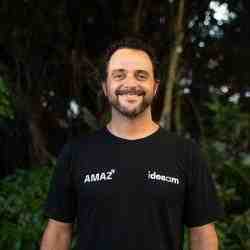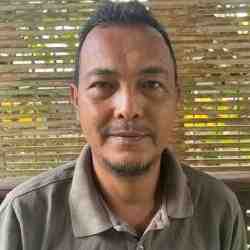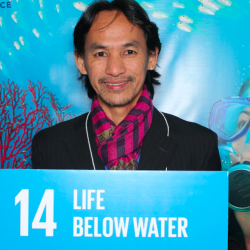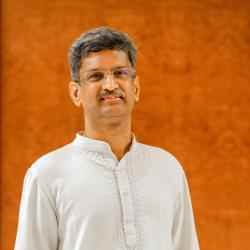Introduction
A barrister from Ireland, Brendan Tobin has developed a program that enables indigenous groups and nongovernmental organizations to make their own decisions and to participate in the negotiation of commercial contracts involving natural and genetic resource rights.
The New Idea
Brendan Tobin is enabling indigenous groups to participate actively in the design and management of projects relating to natural resource exploitation on their territories, as well as to lobby for the development of laws and policies which favor and respect their rights. He provides legal counsel, access to information, and, most importantly, a model for environmental and social impact assessment which strengthens the negotiating and participatory stance of Amazonian natives. His work with indigenous groups and organizations is based on his firm conviction that they, rather than outside parties, are the best advocates for their own true interests and can make sound, reasoned decisions about issues facing their communities.
The cornerstone of Brendan's idea is the democratization of access to Environmental Impact Assessment studies, which must be submitted to the government by firms interested in infrastructure or extraction projects in Peru. Brendan has not only convinced companies to release these Assessments for review by the public, but has also developed a method for training indigenous community leaders and other citizens to submit comments about how proposed projects would impact their natural resources and their communities as a whole. He has persuaded the Peruvian government to consider the indigenous communities' comments when weighing the merits of a given project. Through Brendan's assistance, indigenous peoples are empowered to design and manage their own sustainable development strategies and to defend their environmental, cultural, and territorial rights.
The Problem
The history of development in the Peruvian Amazon has been one of conquest of the jungle with little regard for the rights and concerns of indigenous populations living there. Recently, President Fujimori's privatization program and the reinsertion of Peru into the global economy have resulted in a boom in foreign investment. In the hope of generating revenue as quickly as possible, the government is actively supporting oil companies and their initiatives in the region, without consulting with the natives before granting exportation and exploitation rights. Indigenous groups are often overlooked, and there is very limited interaction between their representative organizations and the oil companies or the government.
Though indigenous peoples have received aid from various entities, it has not yet secured for them ownership of their own development projects, nor the achievement of many of their objectives. Their lack of knowledge and capacity to assess the environmental and cultural impacts of oil company activities limits their ability to exercise effective self-determination. Under Peruvian law, companies are required to carry out Environmental Impact Assessment studies, which must be approved in order for their activities to continue, though plans for compensation remain underdeveloped and underutilized. In addition, indigenous peoples have rarely joined in environmental assessments, which are designed by oil companies, without public participation. On this point, nobody has been willing or able to bridge the communication gap between multinational companies, the government, and indigenous groups.
The Strategy
Brendan has established an organization which includes a team of experts interested in supporting environmental law and protection of indigenous resources. This group trains indigenous leaders and citizen organizations to analyze Environmental Impact Assessments, resolve conflicts, and analyze issues to which they should pay particular attention in order to secure meaningful participation in project design. His strategy identifies key indigenous groups and citizen organizations, and prepares workshops that give these players the tools and expert legal knowledge to negotiate contracts, defend their rights, and work jointly with the government and major extraction corporations.
Companies are not legally obliged to publicize their Assessments until the day of the meeting with indigenous leaders, but Brendan is working to make early distribution of Assessments a requirement so that there is time for affected populations to review them. He also seeks to ensure more effective participation of indigenous peoples in Assessment processes by convincing companies to enter into a meaningful dialogue respectful of their rights. In order to promote this dialogue, Brendan provides legal and technical support so that negotiations and agreements are based on full and informed community consent, understanding of the relevant law, awareness of potential social and environmental impacts, and appreciation of the true social costs and market value of the goods or services to be produced. He supports indigenous leaders who enter into commercial agreements with model contracts and marketing strategies.
Brendan´s training focuses on the two areas of commercial interest which are important to indigenous peoples and have the attention of national authorities: oil and genetic resource trades. He is distributing summaries of the most important issues in Environmental Impact Assessments submitted by the oil industry, using scientists in Peru and abroad to study their scope and mitigation procedures. He also works with oil companies to secure more effective participation by indigenous groups in the development of Assessments. Assistance will be given to the Peruvian Environmental Network to define and monitor companies' activities, as well as to promote an environmental defense fund in order to ensure that companies comply with their Assessment obligations or risk prosecution.
Brendan also seeks to protect legal rights to indigenous collective knowledge. Part of his strategy involves pressuring government authorities to ensure their compliance with the Convention on Biological Diversity, writing proposals to change the law which governs the protection of genetic resources, and participating in international working groups to ensure that informed consent becomes a condition for the use of indigenous knowledge. Indigenous groups count on his assistance through legal advice in the negotiation of genetic resource contracts, capacity-building workshops, and information about the genetic resource trade and mechanisms for their protection.
His work has already produced important results. Working as a legal adviser to the Aguaruna people of the northern region of the Amazon, Brendan obtained a commercial licensing agreement with a pharmaceutical firm, Searle and Company, the first time a contract was used to protect indigenous rights. He explained intellectual property rights to the Aguaruna, and they decided for themselves how to use the information he gave them. As a result, the Aguaruna will enter into a direct commercial agreement with the company and will receive annual payments and royalties. Not only does this agreement benefit the Aguaruna, but it also sets a precedent for the future treatment of indigenous intellectual property rights around the world. Brendan has also assisted indigenous peoples of the Lower Urubamba region in opening meaningful debate and consultation with Shell and its proposed development of the Camisea gas field, the largest in Latin America. Shell agreed to pay for capacity-building for indigenous communities and released copies of its environmental assessment studies to indigenous groups prior to state approval, the first time this has happened in Peru. Indigenous people were thus able to comment on the development plans of an extraction company before a public audience. The Ministry of Energy and Mines has, as a result, extended public participation rights in Environmental Impact Assessment approval procedures.
The Person
Born, raised, and trained as a lawyer in Ireland, Brendan brings his cultural pride and abhorrence for colonialism and injustice to his work in defense of indigenous rights in the Peruvian Amazon. After passing the Irish bar, he sought work with a barrister on European Competition Law. He was drawn to the practice of human rights law and convinced that the common emphasis on civil and political rights should not exclude economic and social rights.
In 1991, while working for a major computer firm in England, Brendan began to focus on environmental law and impacts, attempting to convince his firm to take a strong position on the environment at the Rio Summit. He resigned when the firm didn't agree with his position and used his savings to study more about environmental law and human rights. With his Peruvian wife, he emigrated to Peru, where he spent the next nine months studying and writing on issues he saw as fundamental to the sustainable development debate, including international environmental law and the right to food, design of a global model for environmental impact assessments, and state responsibility for trans-boundary environmental damage.
Brendan dedicates himself to the economic and social rights of Amazonian communities. He has left behind a career as a lawyer for international corporations to go to Peru and work in defense of sustainable development and indigenous groups. His vision remains pragmatic, in that he accepts the presence of multinationals and assists indigenous communities to negotiate and coexist with them under more favorable economic and legal terms.




